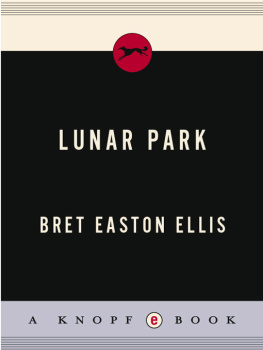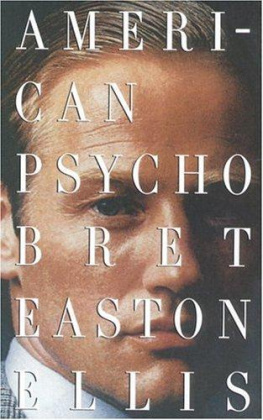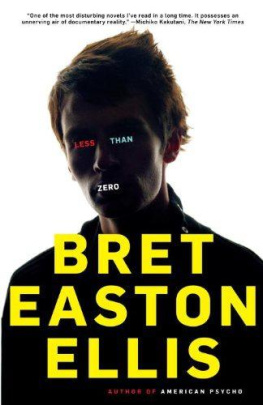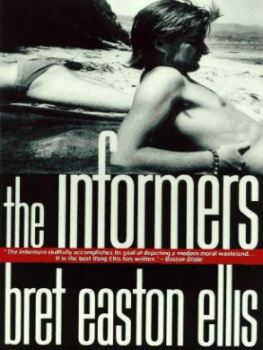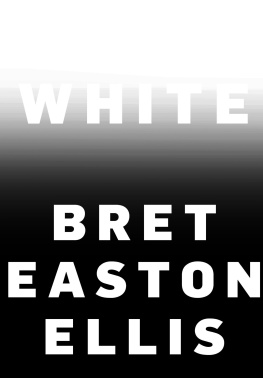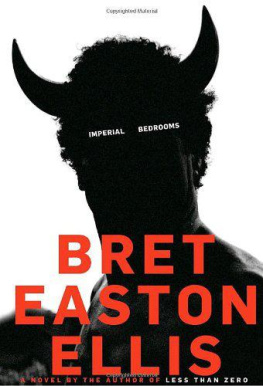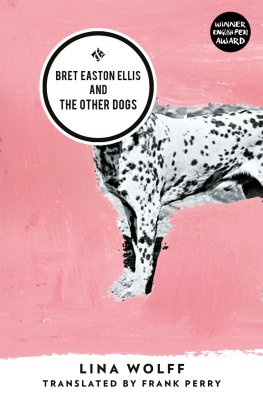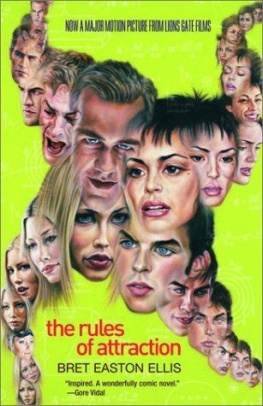table of contents
Title Page
Dedication
Epigraph
1. The Beginnings
2. The Party
3. Morning
4. The Novel
5. The College
6. The Shrinks
7. Robbys Room
8. Halloween
9. Outside
10. The Mall
11. Detective
12. The Dinner Party
13. Parent/Teacher Night
14. The Kids
15. The Attachments
16. The Wind
17. Couples Counseling
18. Spago
19. The Cat
20. Kentucky Pete
21. The Actor
22. Interlude
23. The Phone Call
24. The Darkness
25. The Thing in the Hall
26. The Meeting
27. The Haunted
28. Los Angeles
29. The Attack
30. The Awakening
31. The Endings
Other Books by Bret Easton Ellis
Copyright Page
BRET EASTON ELLIS
LUNAR PARK
ALFRED A. KNOPF . NEW YORK . 2005
for
ROBERT MARTIN ELLIS
19411992
and
MICHAEL WADE KAPLAN
19742004
The occupational hazard of making a spectacle of yourself, over the long haul, is that at some point you buy a ticket too.
THOMAS MCGUANE, Panama
People who have made up their minds about a man do not like to have their opinions changed, to reverse their judgments on account of some new evidence or new arguments, and the man who tries to compel them to change their minds is at least wasting his time, and he may be asking for trouble.
JOHN OHARA
From the table of my memory Ill wipe away all trivial fond records, All saws of books, all forms, all pressures past That youth and observation copied there.
Hamlet,I: v. 98
1. the beginnings
You do an awfully good impression of yourself. This is the first line of Lunar Park and in its brevity and simplicity it was supposed to be a return to form, an echo, of the opening line from my debut novel, Less Than Zero.
People are afraid to merge on freeways in Los Angeles.
Since then the opening sentences of my novelsno matter how artfully composedhad become overly complicated and ornate, loaded down with a heavy, useless emphasis on minutiae.
My second novel, The Rules of Attraction, for example, began with this:
and its a story that might bore you but you dont have to listen, she told me, because she always knew it was going to be like that, and it was, she thinks, her first year, or actually weekend, really a Friday, in September, at Camden, and this was three or four years ago, and she got so drunk that she ended up in bed, lost her virginity (late, she was eighteen) in Lorna Slavins room, because she was a Freshman and had a roommate and Lorna was, she remembers, a Senior or Junior and usually sometimes at her boyfriends place off-campus, to who she thought was a Sophomore Ceramics major but who was actually either some guy from N.Y.U., a film student, and up in New Hampshire just for The Dressed To Get Screwed party, or a townie.
The following is from my third novel, American Psycho.
ABANDON ALL HOPE YE WHO ENTER HEREis scrawled in blood red lettering on the side of the Chemical Bank near the corner of Eleventh and First and is in print large enough to be seen from the backseat of the cab as it lurches forward in the traffic leaving Wall Street and just as Timothy Price notices the words a bus pulls up, the advertisement for Les Misrables on its side blocking his view, but Price who is with Pierce & Pierce and twenty-six doesnt seem to care because he tells the driver he will give him five dollars to turn up the radio, Be My Baby on WYNN, and the driver, black, not American, does so.
This, from my fourth novel, Glamorama :
Specksspecks all over the third panel, see?no, that onethe second one up from the floor and I wanted to point this out to someone yesterday but a photo shoot intervened and Yaki Nakamari or whatever the hell the designers name isa master craftsman not mistook me for someone else so I couldnt register the complaint, but, gentlemenand ladiesthere they are: specks, annoying, tiny specks, and they dont look accidental but like they were somehow done by a machineso I dont want a lot of description, just the story, streamlined, no frills, the lowdown: who, what, where, when and dont leave out why, though Im getting the distinct impression by the looks on your sorry faces that why wont get answerednow, come on, goddamnit, whats the story ?
( The Informers was a short story collection published between American Psycho and Glamorama and since much of it was written while I was still in collegebefore the publication of Less Than Zero it was an example of the same stripped-down minimalism.)
As anyone who had closely followed the progression of my career could glimpseand if fiction inadvertently reveals a writers inner lifethings were getting out of hand, resembling something that according to the New York Times had become bizarrely complicated... bloated and trivial... hyped-up, and I didnt necessarily disagree. I wanted a return to that past simplicity. I was overwhelmed by my life, and those first sentences seemed reflections of what had gone wrong. It was time to get back to basics, and though I hoped that one lean sentenceYou do an awfully good impression of yourselfwould start the process, I also realized that it was going to require more than a string of words to clear away the clutter and damage that had amassed around me. But it would be the beginning.
When I was a student at Camden College in New Hampshire I took a novel-writing tutorial and produced during the winter of 1983 a manuscript that eventually became Less Than Zero. It detailed a wealthy, alienated, sexually ambiguous young mans Christmas break from an eastern college in Los Angelesmore specifically Beverly Hillsand all the parties he wandered through and all the drugs he consumed and all the girls and boys he had sex with and all the friends he passively watched drift into addiction, prostitution and vast apathy; days were spent speeding toward the beach club with beautiful blondes in gleaming convertibles while high on Nembutal; nights were lost in VIP rooms at trendy clubs and snorting cocaine at the window tables of Spago. It was an indictment not only of a way of life I was familiar with but alsoI thought rather grandlyof the Reagan eighties and, more indirectly, of Western civilization in the present moment. My teacher was convinced as well, and after some casual edits and revisions (I had written it quickly in an eight-week crystal-meth binge on the floor of my bedroom in L.A.) he submitted it to his agent and publisher, who both agreed to take it on (the publisher somewhat reluctantlyone member of the editorial board arguing, If theres an audience for a novel about coke-snorting, cock-sucking zombies, then by all means lets publish the damn thing), and I watched with a mixture of fear and fascinationlaced with excitementits transformation from a student assignment into a glossy hardcover that became a huge best seller and zeitgeist touchstone, was translated into twenty-five languages and made into a big-budget Hollywood movie, all within the space of about sixteen months. And in the early fall of 1985, just four months after publication, three things happened simultaneously: I became independently wealthy, I became insanely famous, and, most important, I escaped my father.
My father made the bulk of his money from highly speculative real estate deals, most of them during the Reagan years, and the freedom this money bought made him increasingly unstable. But my father had always been a problemcareless, abusive, alcoholic, vain, angry, paranoidand even after my parents divorced when I was a teenager (my mothers demand) his power and control continued to loom over the family (which also included two younger sisters) in ways that were all monetary (endless arguments between lawyers about alimony and child support). It was a mission of his, a crusade, to weaken us, to make us intensely aware of how wenot his behaviorwere to blame for the fact that he was no longer wanted in our lives. He left the house in Sherman Oaks under protest and moved to Newport Beach and his rage continued to clash with our peaceful Southern California surroundings: the lazy days hanging by the pool beneath a relentlessly clear and sunny sky, the mindless wanderings through the Galleria, the endless driving with swaying palm trees guiding us toward our destinations, the easygoing conversations over a soundtrack of Fleetwood Mac and the Eaglesall the laid-back advantages of growing up in that time and place were considerably darkened by his invisible presence. This languid lifestyle, decadent and loose, never relaxed my father. He remained, always, locked in a kind of demented fury, no matter how mellow the surface circumstances of his life really were. And because of this the world was threatening to us in a vague and abstract way we couldnt work ourselves out ofthe map had disappeared, the compass had been smashed, we were lost. My sisters and I discovered a dark side to life at an unusually early age. We learned from our fathers behavior that the world lacked coherence, and that within this chaos people were doomed to failure, and these realizations clouded our every ambition. And so my father was the sole reason I fled to a college in New Hampshire rather than stay in L.A. with my girlfriend and enroll at USC like most of my classmates from the private school we attended in the San Fernando Valley suburbs ultimately did. That was my desperate plan. But it was too late. My father had blackened my perception of the world, and his sneering, sarcastic attitude toward everything had latched on to me. As much as I wanted to escape his influence, I couldnt. It had soaked into me, shaped me into the man I was becoming. Whatever optimism I might have held on to had been swept away by the very nature of his being. The uselessness in thinking that escaping him physically would make a difference was so pathetic that I spent that first year at Camden paralyzed by anxiety and depression. The thing I resented most about my father was that the pain he inflicted on meverbal and physicalwas the reason I became a writer. (Added fact: he also beat our dog.)

